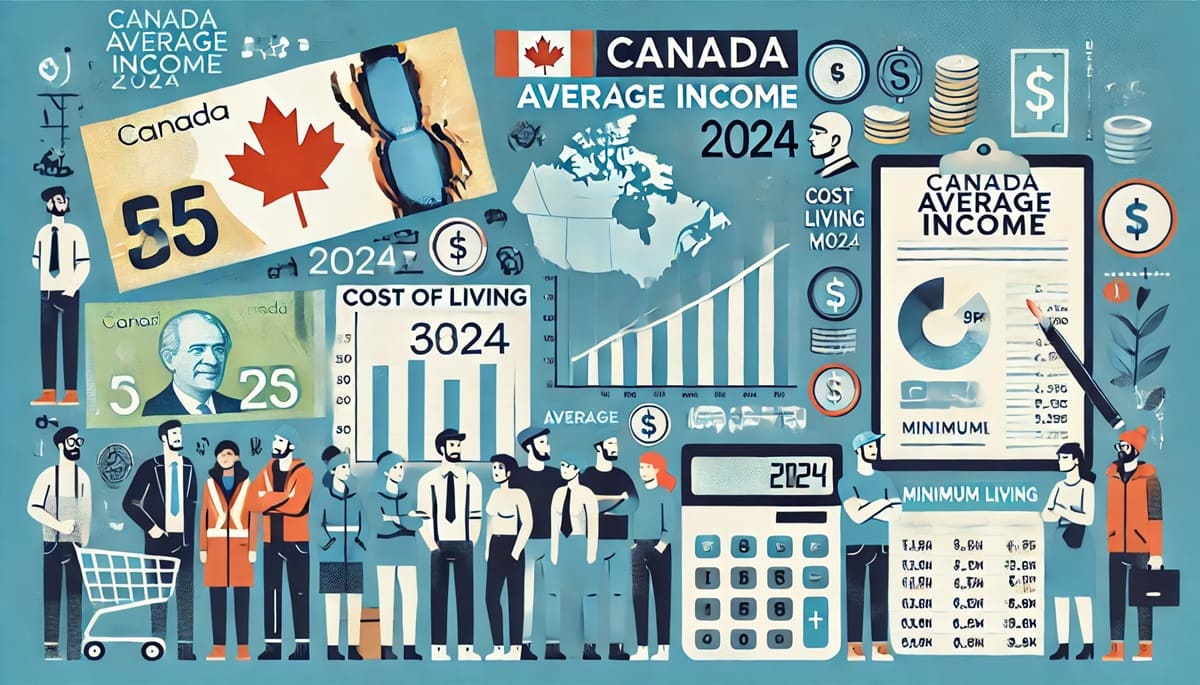Canada stands second in the list of largest countries and covers around 40% of the continent of North America. However, being so large in size, the country is sparsely populated, but the infrastructure of Canada happens to be super-strong and commendable.
Average income also known as per capita income is the average amount of money earned by every person at a certain time. In Canada, the average income is calculated “by adding up all the incomes of a group and dividing by the number of people in that group”. According to reports, the average income of Canada in 2024 varies from $54,600 to $105,000. Compared to previous years, Canadians have started making more money.
In this article, we will learn about average income in Canada, its eligibility, and more things.
Contents
Average Income in Canada
In 2023, Canada was listed in “the top 20 list for paying the highest rates paying county in the world.” Income is the most required part of life in order to live it beautifully. Here are the details of the average income earned by Canadians per hour-
Province Wages (P/Hr)
- Minimum Wage in Alberta- 15 CAD
- Minimum Wage in Ontario- 16.55 CAD
- Minimum Wage in British Columbia- 16.75 CAD
- Minimum Wage in Manitoba- 3 CAD
- Minimum Wage in Nova Scotia- 15 CAD
- Minimum Wage in Saskatchewan- 14 CAD
Service Sectors in Canada
Here is the list of service sectors in Canada that offer a source of earning to Canadians-
- Retail: The average salary in the Canadian retail industry is $35, 099 or $18/hour.
- Food: The average salary in the Canadian food and beverage industry is $31, 216 or $16/hour.
- Transport: The average salary in the Canadian Transport industry is $67, 558 or $34.64/hour.
- Banking: The average salary in the Canadian banking industry is $96, 956 or $49.72
- Hospitality: The average salary in the Canadian hospitality industry is $55, 005 or $28.21
- Healthcare: The average salary in the Canadian healthcare industry is $89, 752 or $46.03
The aforementioned sectors give revenue to the average income, either monthly or annually. According to the needs of the populace, the government launches a number of different programs.
Cost of Living in Canada
Those who choose to remain in Canada are aware of how pricey the average lifestyle is. The cost of living for a single person living without rent is $996.1. The couple’s monthly expenses in the nation come to more than $4000. Transportation, food, personal needs, and other expenses are included in the price. With every fiscal year, the average income in Canada varies, raising people’s standards of living in the process.
The cost of living in the nation has gone higher due to a shortage of labour and housing. To better manage their spending, the inhabitants must work even harder to increase their income. There is a small distinction between single people and couples.
Employment in Canada
The nation’s employment rate is currently 62.1%. To improve GDP, the percentage is progressively rising from prior years. The unemployment rate in June was 5.4%, a number that the government later stressed as being critical to development.
The latest statistics ensure growth, as the unemployment rate in the country was 5.28 per cent. The Labour Force Survey, which takes into account both the general working population and the unemployed, is the source of these statistics.
Learn Monthly and Annual Average Income in Canada in Previous Years-
In previous years, the individual’s yearly income from employment was $59,300. The Canadians work for a set amount of time in order to cover their bills. As we’ve already covered, the Canada Revenue Agency manages the costs collaterally to facilitate a more seamless assessment of the nation’s financial situation.
The average pay that employees receive for the work they complete is $25 per hour. The monthly average income is determined by multiplying the total number of hours worked by the lowest wage.
